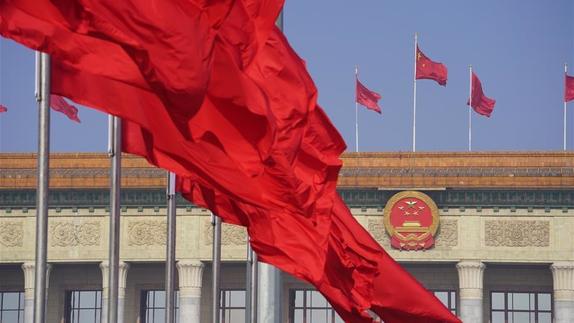 Photo taken on May 22, 2020 shows flags on the Tian'anmen Square and atop the Great Hall of the People in Beijing, capital of China. The third session of the 13th National People's Congress (NPC) will hold its opening meeting at the Great Hall of the People on Friday morning. (XING GUANGLI / XINHUA)
Photo taken on May 22, 2020 shows flags on the Tian'anmen Square and atop the Great Hall of the People in Beijing, capital of China. The third session of the 13th National People's Congress (NPC) will hold its opening meeting at the Great Hall of the People on Friday morning. (XING GUANGLI / XINHUA)
BEIJING - The Standing Committee of the 13th National People's Congress (NPC) will convene its 34th session from April 18 to 20 in Beijing.
The decision was made on Monday at a meeting of the Council of Chairpersons of the NPC Standing Committee, which was presided over by Li Zhanshu, chairman of the NPC Standing Committee.
Lawmakers will review draft laws on futures and derivatives, and black soil protection. They will also deliberate on draft revisions to the Vocational Education Law, the Physical Culture and Sports Law, and the Law on the Protection of Women's Rights and Interests
According to the proposed agenda of the standing committee session, lawmakers will review draft laws on futures and derivatives, and black soil protection. They will also deliberate on draft revisions to the Vocational Education Law, the Physical Culture and Sports Law, and the Law on the Protection of Women's Rights and Interests.
ALSO READ: National legislature holds closing meeting of annual session
In accordance with the Constitution and relevant laws, the election of deputies to the 14th NPC will be completed in January 2023 before the incumbent 13th NPC deputies finish their term of office in March 2023.
The Council of Chairpersons of the NPC Standing Committee has drafted plans for the quotas of deputies to the 14th NPC for different regions and ethnic groups, which are expected to be reviewed at the upcoming session.
Lawmakers will consider the ratification of the revised agreement on regional anti-terrorism structure involving the member states of the Shanghai Cooperation Organization. They will also review the ratification of the Forced Labour Convention, 1930, and the Abolition of Forced Labour Convention, 1957.
READ MORE: China to further develop laws related to foreign affairs


